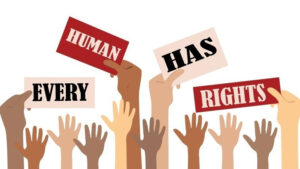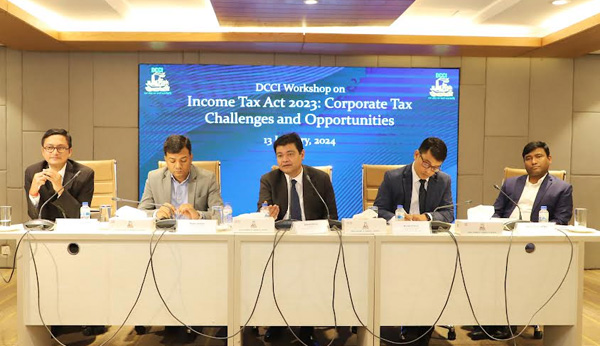 Professor Moin Uddin: Human rights are the essential facilities for human life, rights, equality and dignified life. Human rights are the birthright of human beings. Rights can never be taken away from anyone. On December 10, 1948, the Universal Declaration of Human Rights was adopted at the United Nations.The basic human rights of people have been identified there. For this, December 10 is celebrated as Human Rights Day. According to the National Human Rights Commission Act, 2009, “Human Rights means the life, rights, equality and dignity of an individual guaranteed by the Constitution of the People’s Republic of Bangladesh and the human rights declared in various international human rights instruments ratified by the People’s Republic of Bangladesh and enforceable by the customary courts of Bangladesh.The principles of human rights are equality, humanity, dignity, social justice. The principles of human rights accepted internationally have been recognized in the Bangladesh constitution and various provisions have been included in the constitution to protect the human rights of citizens. Article 11 of the Constitution of the People’s Republic of Bangladesh states, “The Republic shall be a democracy, where fundamental human rights and freedoms shall be guaranteed, and respect for the dignity and value of human beings shall be guaranteed.”The Constitution includes provisions for the protection of economic and social human rights such as food, clothing, shelter, medical care, public health, employment, rest and recreation and social security, and civil, political and cultural rights.
Professor Moin Uddin: Human rights are the essential facilities for human life, rights, equality and dignified life. Human rights are the birthright of human beings. Rights can never be taken away from anyone. On December 10, 1948, the Universal Declaration of Human Rights was adopted at the United Nations.The basic human rights of people have been identified there. For this, December 10 is celebrated as Human Rights Day. According to the National Human Rights Commission Act, 2009, “Human Rights means the life, rights, equality and dignity of an individual guaranteed by the Constitution of the People’s Republic of Bangladesh and the human rights declared in various international human rights instruments ratified by the People’s Republic of Bangladesh and enforceable by the customary courts of Bangladesh.The principles of human rights are equality, humanity, dignity, social justice. The principles of human rights accepted internationally have been recognized in the Bangladesh constitution and various provisions have been included in the constitution to protect the human rights of citizens. Article 11 of the Constitution of the People’s Republic of Bangladesh states, “The Republic shall be a democracy, where fundamental human rights and freedoms shall be guaranteed, and respect for the dignity and value of human beings shall be guaranteed.”The Constitution includes provisions for the protection of economic and social human rights such as food, clothing, shelter, medical care, public health, employment, rest and recreation and social security, and civil, political and cultural rights.
Protection of human rights and its development is the main responsibility of the state. The state works to protect the human rights of the people through its administrative, judicial and legal departments. Different countries of the world establish national human rights institutions to provide the necessary recommendations to the state to improve the human rights situation in their countries. Although formed by the state, national human rights institutions operate independently.They monitor the overall human rights situation in the country and after due review make necessary recommendations to the state in this regard. Through its own observations on various issues, it provides necessary recommendations to the government to improve the human rights situation and advises the government to identify those responsible for human rights violations through investigation and take necessary measures against them. The importance of such institutions is increasing day by day in the country.At present, more or less 120 countries of the world have National Human Rights Commissions.The National Human Rights Commission in Bangladesh was established in June 2010 by the National Human Rights Commission Act-2009 with a chairman, one full-time member and five unpaid members.
The jurisdiction of the National Human Rights Commission of Bangladesh is quite wide. This jurisdiction is reserved in the National Human Rights Commission Act and international human rights treaties to which Bangladesh is a party, etc.According to Section-12 of the National Human Rights Commission Act 2009, the functions of the Commission are as follows- To investigate any complaint of violation of human rights with powers similar to that of a civil court under the Code of Civil Procedure, 1908.Even if the complaint is not filed with the Commission, the Commission may receive the complaint suo moto; Visiting places of detention such as jails, police stations etc. and making recommendations to the government for their development; Inspecting service institutions such as hospitals, educational institutions and providing recommendations to the government to improve their standards; Providing recommendations to the government for its effective implementation by reviewing the recognized measures under the existing laws of the country;researching various international instruments on human rights and making recommendations to the government for their implementation; Taking necessary initiatives to harmonize and harmonize domestic laws with international human rights laws; Conduct research on human rights issues and play a role in their implementation in educational and professional institutions; Creating public awareness on human rights through publicity, publications, seminars, symposiums, workshops and other similar measures;to settle any grievance by mediation and conciliation; Providing training to members of law enforcement agencies and others on human rights protection issues; Providing necessary advice and guidance to aggrieved persons/service seekers in cases of human rights violations; Competing as necessary in any court case or legal proceeding for violation of human rights or providing legal assistance to the victim.
Bangladeshi citizens of any age can complain to the commission regardless of caste, religion, caste. The aggrieved person himself or any other person or institution on his behalf can also file a complaint. Considering the situation, the commission can also accept complaints on its own initiative. Complaints can be made to the National Human Rights Commission if there is a violation or threat of violation of the rights granted to all citizens in the Constitution of the People’s Republic of Bangladesh, or if the rights described in recognized international human rights laws are violated.If someone feels that his right to life, equality and dignity owed to the state as a human being has been violated or threatened to be violated i.e. human rights (life, right , rights to equality and dignity) are violated or incitement to violations or negligence to prevent violations of these rights can be complained to the Human Rights Commission.Complaints can be sent by hand writing or typing on the prescribed form of the Commission or on white paper, appearing at the office of the Commission in person or through a representative or by post, fax or e-mail. There is an opportunity to attach other documents, pictures, audio, video clips etc. with the complaint. There is a facility to file complaints through online complaint management system software. For filing complaints online www.complaint.nhrc.org.bd; Visit the website and follow the next instructions.
After receiving the complaint the Selection Cell of the Commission will examine the legal aspect of the complaint; If the Selection Cell finds that the application is outside the jurisdiction of the Commission, it will send a written reply to the address of the complainant within the next seven days with advice on what the complainant should do.And if the complaint is within the jurisdiction of the Commission, the Commission will investigate the matter of the complaint, if the investigation reveals the violation of human rights, then the Commission will try to settle the dispute between the complainant and the accused through mediation and conciliation, if the mediation is not successful, a case or any other proceedings will be filed against the person who violated the human rights. The Commission will make recommendations to the appropriate authorities to do so.
No financial transaction/expenditure is required at any stage from filing of complaint to settlement for making complaint or inquiry about complaint, pre-complaint consultation etc. The main objective of the commission is to preserve and develop the overall human rights situation of the country by ensuring that the state institutions do not abuse their powers and violate the rights of citizens to dignity, respect, equality etc.Address of the Commission – National Human Rights Commission (a statutory independent state institution established by the National Human Rights Commission Act, 2009) BTMC Bhawan (9th Floor), 7-9 Kawran Bazar, Dhaka-1215, Helpline: 16108 PABX: 02-55013726-28, E-mail: info@nhrc.org.bd.
Everyone should be aware of human rights. By establishing social justice, it will be possible to ensure the dignity, respect and equality of citizens by transforming the country into a welfarestate.






